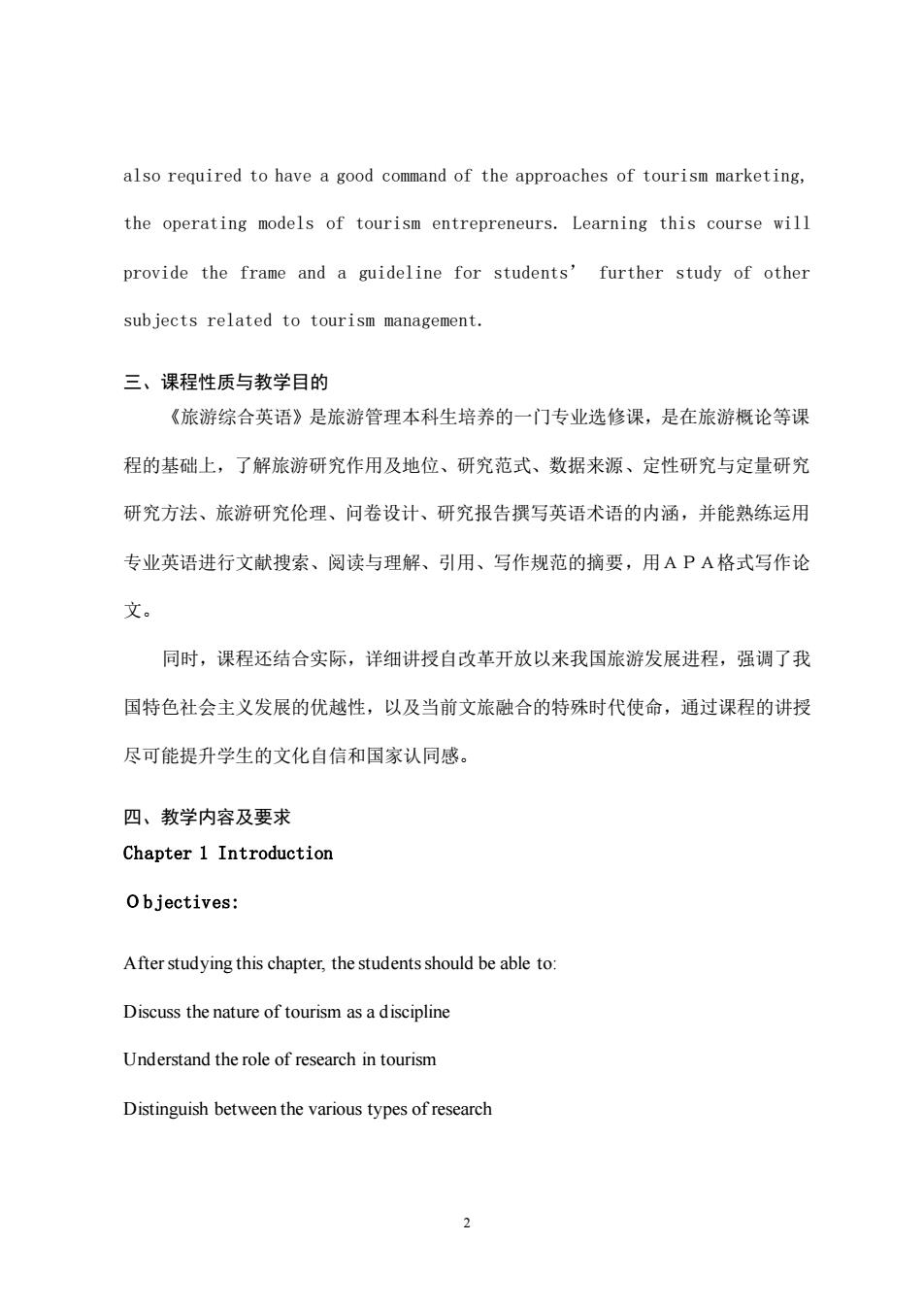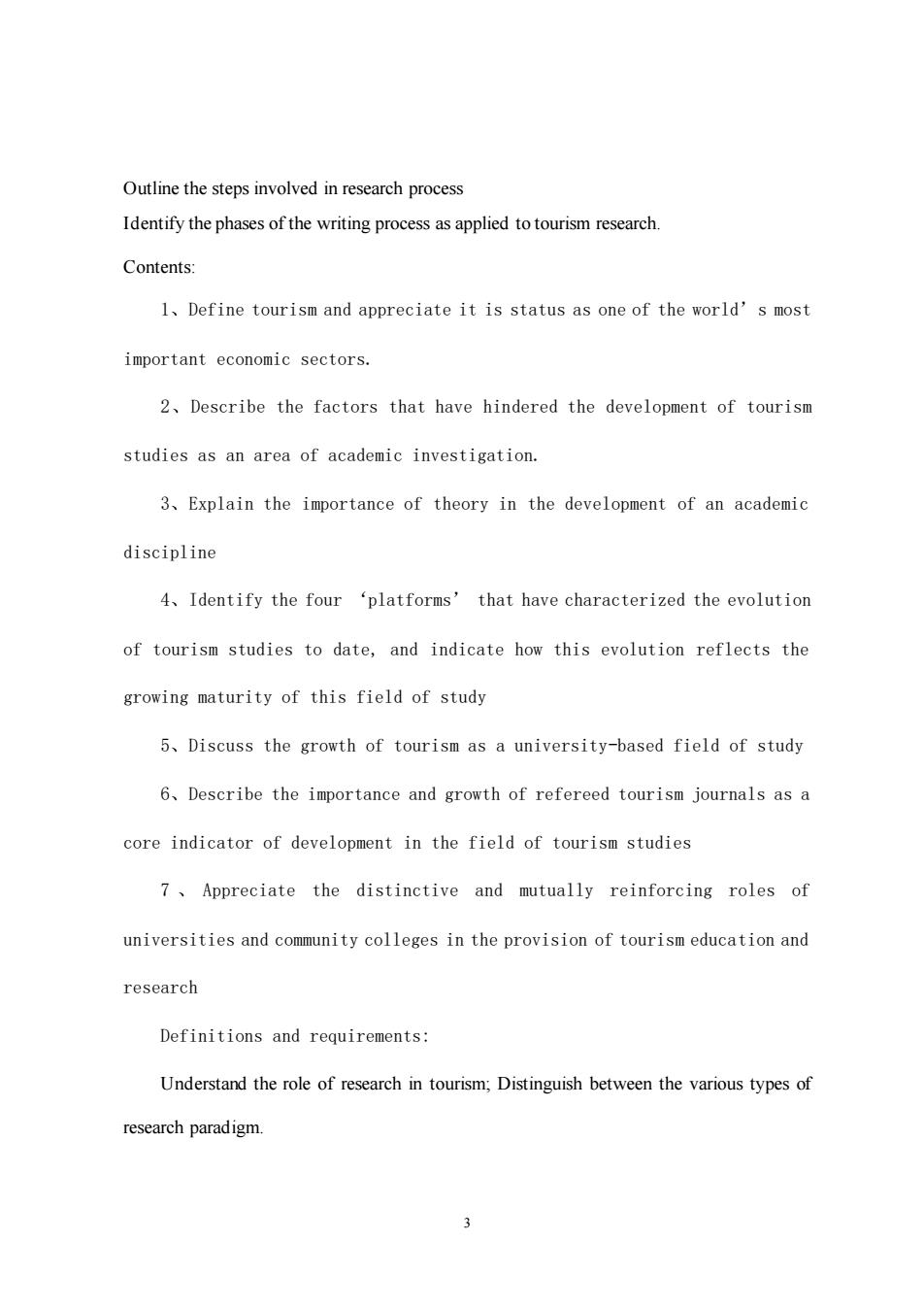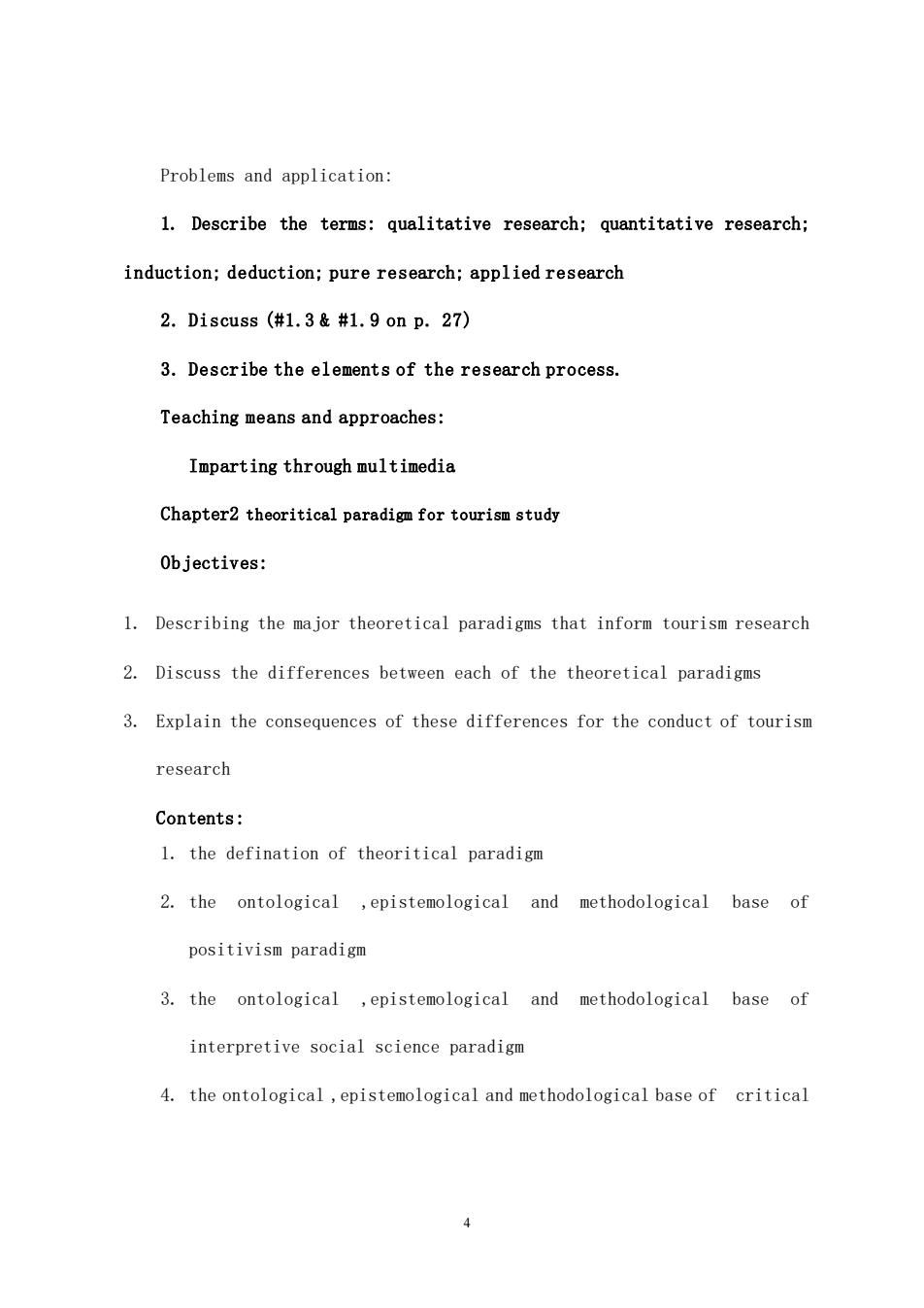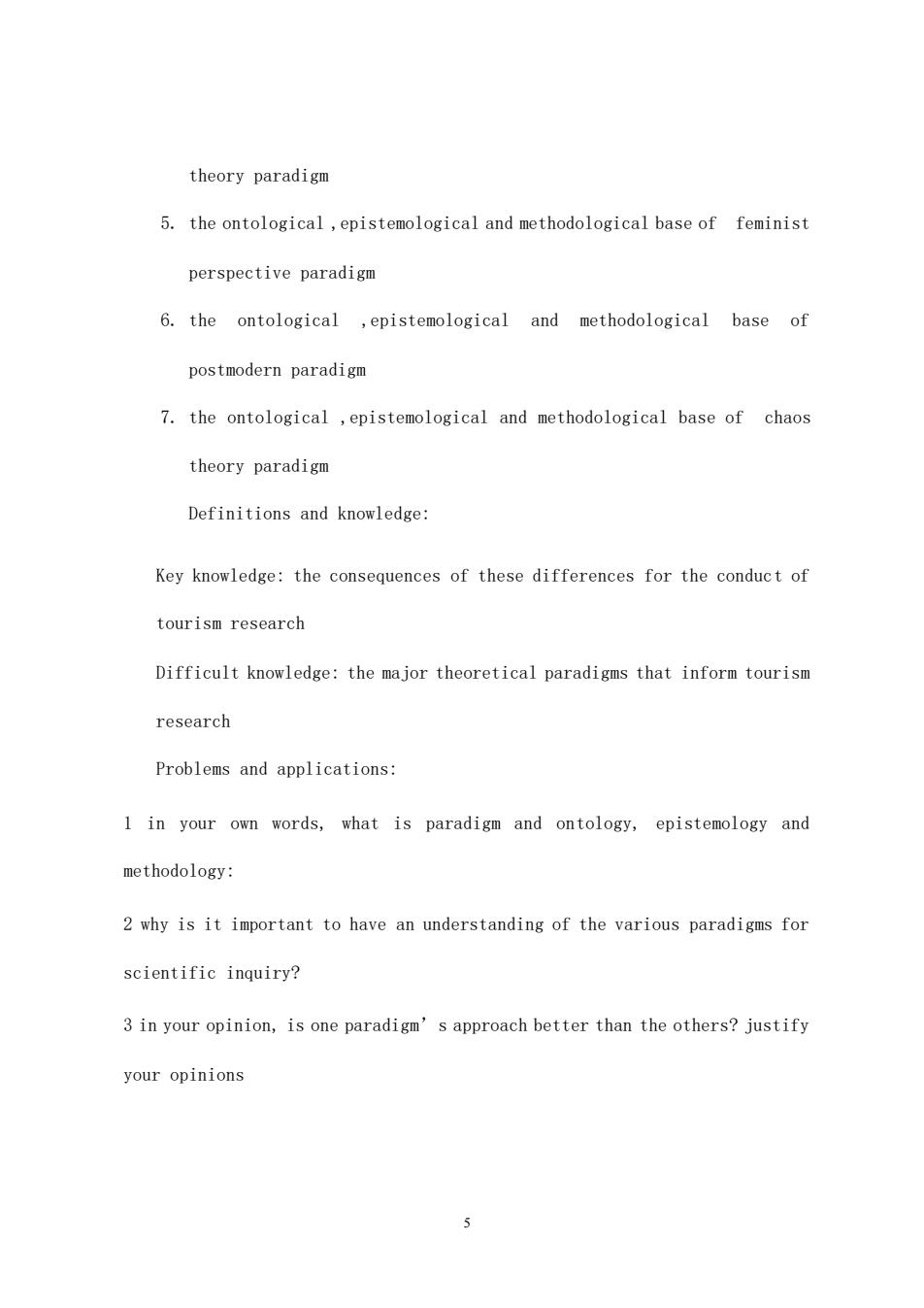
旅游综合英语课程大纲 一、课程基本信息 课程代码:18080042 课程名称:旅游综合英语 英文名称:English for Tourism and Hospitality 课程类别:专业选修课 学时:32 学分:2 适用对象:2021级及以后旅游管理本科生 考核方式:考查与期末考试相结合。平时作业40%,期末考试60% 先修课程:旅游概论、旅游经济学、旅游地理学、旅游消费行为研究等 二、课程简介 修完本课程后,学生应掌握旅游研究基本原理、旅游活动的规律、特点及在国民 经济中的地位等专业术语的内涵与英语表达。学生也应良好掌握旅游市场研究方法、 旅游企业运营模式等专业英语的表达。学完本课程后,学生能熟练运用英语搜索、阅 读、运用英语专业文献,有APA格式写作规范的英文论文摘要。 After studying the course the students are required to understand the basic principles of tourism and travel research,the law of tourism activities, its characteristics and its position in national economics.The students are
旅游综合英语课程大纲 一、课程基本信息 课程代码:18080042 课程名称:旅游综合英语 英文名称:English for Tourism and Hospitality 课程类别:专业选修课 学 时:32 学 分:2 适用对象: 2021 级及以后旅游管理本科生 考核方式:考查与期末考试相结合。平时作业40%,期末考试60% 先修课程:旅游概论、旅游经济学、旅游地理学、旅游消费行为研究等 二、课程简介 修完本课程后,学生应掌握旅游研究基本原理、旅游活动的规律、特点及在国民 经济中的地位等专业术语的内涵与英语表达。学生也应良好掌握旅游市场研究方法、 旅游企业运营模式等专业英语的表达。学完本课程后,学生能熟练运用英语搜索、阅 读、运用英语专业文献,有APA格式写作规范的英文论文摘要。 After studying the course the students are required to understand the basic principles of tourism and travel research, the law of tourism activities, its characteristics and its position in national economics. The students are

also required to have a good command of the approaches of tourism marketing, the operating models of tourism entrepreneurs.Learning this course will provide the frame and a guideline for students'further study of other subjects related to tourism management. 三、课程性质与教学目的 《旅游综合英语》是旅游管理本科生培养的一门专业选修课,是在旅游概论等课 程的基础上,了解旅游研究作用及地位、研究范式、数据来源、定性研究与定量研究 研究方法、旅游研究伦理、问卷设计、研究报告撰写英语术语的内涵,并能熟练运用 专业英语进行文献搜索、阅读与理解、引用、写作规范的摘要,用APA格式写作论 ě 同时,课程还结合实际,详细讲授自改革开放以来我国旅游发展进程,强调了我 国特色社会主义发展的优越性,以及当前文旅融合的特殊时代使命,通过课程的讲授 尽可能提升学生的文化自信和国家认同感。 四、教学内容及要求 Chapter 1 Introduction Objectives: After studying this chapter,the studentsshould be able to: Discuss the nature of tourism as a discipline Understand the role of research in tourism Distinguish between the various types of research 2
2 also required to have a good command of the approaches of tourism marketing, the operating models of tourism entrepreneurs. Learning this course will provide the frame and a guideline for students’ further study of other subjects related to tourism management. 三、课程性质与教学目的 《旅游综合英语》是旅游管理本科生培养的一门专业选修课,是在旅游概论等课 程的基础上,了解旅游研究作用及地位、研究范式、数据来源、定性研究与定量研究 研究方法、旅游研究伦理、问卷设计、研究报告撰写英语术语的内涵,并能熟练运用 专业英语进行文献搜索、阅读与理解、引用、写作规范的摘要,用APA格式写作论 文。 同时,课程还结合实际,详细讲授自改革开放以来我国旅游发展进程,强调了我 国特色社会主义发展的优越性,以及当前文旅融合的特殊时代使命,通过课程的讲授 尽可能提升学生的文化自信和国家认同感。 四、教学内容及要求 Chapter 1 Introduction Objectives: After studying this chapter, the students should be able to: Discuss the nature of tourism as a discipline Understand the role of research in tourism Distinguish between the various types of research

Outline the steps involved in research process Identify the phases of the writing process as applied to tourism research. Contents: 1.Define tourism and appreciate it is status as one of the world's most important economic sectors. 2.Describe the factors that have hindered the development of tourism studies as an area of academic investigation. 3.Explain the importance of theory in the development of an academic discipline 4.Identify the four platforms'that have characterized the evolution of tourism studies to date,and indicate how this evolution reflects the growing maturity of this field of study 5,Discuss the growth of tourism as a university-based field of study 6.Describe the importance and growth of refereed tourism journals as a core indicator of development in the field of tourism studies 7,Appreciate the distinctive and mutually reinforcing roles of universities and community colleges in the provision of tourism education and research Definitions and requirements: Understand the role of research in tourism:Distinguish between the various types of research paradigm. 3
3 Outline the steps involved in research process Identify the phases of the writing process as applied to tourism research. Contents: 1、Define tourism and appreciate it is status as one of the world’s most important economic sectors. 2、Describe the factors that have hindered the development of tourism studies as an area of academic investigation. 3、Explain the importance of theory in the development of an academic discipline 4、Identify the four ‘platforms’ that have characterized the evolution of tourism studies to date, and indicate how this evolution reflects the growing maturity of this field of study 5、Discuss the growth of tourism as a university-based field of study 6、Describe the importance and growth of refereed tourism journals as a core indicator of development in the field of tourism studies 7 、 Appreciate the distinctive and mutually reinforcing roles of universities and community colleges in the provision of tourism education and research Definitions and requirements: Understand the role of research in tourism; Distinguish between the various types of research paradigm

Problems and application: 1.Describe the terms:qualitative research;quantitative research; induction;deduction;pure research;applied research 2.Discuss(#1.3.9onp.27) 3.Describe the elements of the research process Teaching means and approaches: Imparting through multimedia Chapter2 theoritical paradigm for tourism study Objectives: 1.Describing the major theoretical paradigms that inform tourism research 2.Discuss the differences between each of the theoretical paradigms 3.Explain the consequences of these differences for the conduct of tourism research Contents: 1.the defination of theoritical paradigm 2.the ontological,epistemological and methodological base of positivism paradigm 3.the ontological,epistemological and methodological base of interpretive social science paradigm 4.the ontological,epistemological and methodological base of critical 4
4 Problems and application: 1. Describe the terms: qualitative research; quantitative research; induction; deduction; pure research; applied research 2. Discuss (#1.3 & #1.9 on p. 27) 3. Describe the elements of the research process. Teaching means and approaches: Imparting through multimedia Chapter2 theoritical paradigm for tourism study Objectives: 1. Describing the major theoretical paradigms that inform tourism research 2. Discuss the differences between each of the theoretical paradigms 3. Explain the consequences of these differences for the conduct of tourism research Contents: 1. the defination of theoritical paradigm 2. the ontological ,epistemological and methodological base of positivism paradigm 3. the ontological ,epistemological and methodological base of interpretive social science paradigm 4. the ontological ,epistemological and methodological base of critical

theory paradigm 5.the ontological,epistemological and methodological base of feminist perspective paradigm 6.the ontological,epistemological and methodological base of postmodern paradigm 7.the ontological,epistemological and methodological base of chaos theory paradigm Definitions and knowledge: Key knowledge:the consequences of these differences for the conduct of tourism research Difficult knowledge:the major theoretical paradigms that inform tourism research Problems and applications: 1 in your own words,what is paradigm and ontology,epistemology and methodology 2 why is it important to have an understanding of the various paradigms for scientific inquiry? 3 in your opinion,is one paradigm's approach better than the others?justify your opinions 5
5 theory paradigm 5. the ontological ,epistemological and methodological base of feminist perspective paradigm 6. the ontological ,epistemological and methodological base of postmodern paradigm 7. the ontological ,epistemological and methodological base of chaos theory paradigm Definitions and knowledge: Key knowledge: the consequences of these differences for the conduct of tourism research Difficult knowledge: the major theoretical paradigms that inform tourism research Problems and applications: 1 in your own words, what is paradigm and ontology, epistemology and methodology: 2 why is it important to have an understanding of the various paradigms for scientific inquiry? 3 in your opinion, is one paradigm’s approach better than the others? justify your opinions